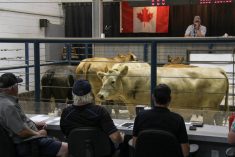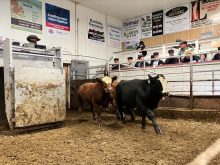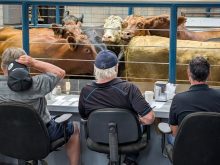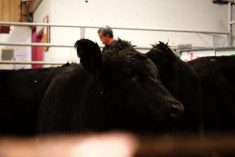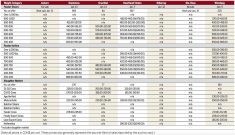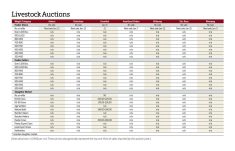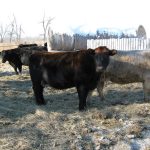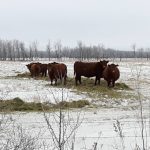This past spring saw a bull market in terms of cattle prices. The fact of fewer animals in North America caused cattle futures on the Chicago Mercantile Exchange, as well as local prices, to surge toward levels unseen in nearly a decade.
Manitoba Beef Producers past-president Tyler Fulton, now vice-president of the Canadian Cattle Association, said revenues are mostly determined by the fall run, but the spring was supportive for the entire industry.
“Prices are one-third higher than what they were last year in the calf and feeder markets. That’s exactly what we needed in order to return to profitability in the beef industry across all of Canada,” he said.
Read Also

Trade uncertainty, tariffs weigh on Canadian beef sector as market access shifts
Manitoba’s beef cattle producers heard more about the growing uncertainty they face as U.S. tariffs, and shifting trade opportunities, reshape their market.
Manitoba cattle have seen strong demand from the rest of the Prairies as well as Ontario, according to Fulton.
“The tight supply across Canada has shifted the dynamic, so that there really is a great deal of competition and interest in pushing prices higher to ensure they get the cattle in order to fill their lot.
“On the feeding side, there are some margins there as well. It’s really motivating cattle buyers to not hold back and they’re chasing prices higher to reflect the short supply,” he said.
Beef producers in Manitoba acknowledged the widespread dry conditions so far this spring, but Fulton said they don’t expect a repeat of the historic drought of 2021.
“I think there’s good reason for optimism to see a bit of recovery,” he said. “Overall, when you combine the whole picture, whether it be weather conditions or growing conditions and the market, things look really good. Knock on wood.”
There have already been forward sales of calves for September and October deliveries, according to Fulton, providing indicators for price levels in the fall run.
“For a (550- to 600-lb.) calf, prices would be between $350 and $375 (per hundredweight) for that category of animal. That’s exceptional,” he said.
“We’re now past the time producers can utilize calf insurance policy, but those that are grassing feeder animals, we see great pricing opportunities in livestock price insurance that can secure profitability this year.”
Three months after current MBP president Matthew Atkinson was elected, Fulton gave a vote of confidence to his successor, calling him a “phenomenal advocate for the beef industry.”
“He’s got a ton of experience in a lot of different ways. More than just a cattle producer, he’s spent time in community pasture management. He’s spent time on livestock transport,” Fulton said of Atkinson, who owns a cow-calf operation near Neepawa.
“He’s just a wealth of knowledge in all aspects of the beef industry. We are in great shape with him as president now.”
On the Chicago exchange, the August live cattle contract added only 7.5 US cents per hundredweight to US$171.15 on June 22. The August feeder cattle contract went down $3.45/cwt. for the week, to $230.675.




